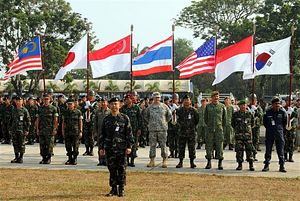Last week, the United States, Thailand, and other key Asian states held the first multilateral iteration of a cyberspace field training exercise within the Cobra Gold exercises – the largest multilateral drill of its kind in the Indo-Pacific region. The exercise spotlighted the ongoing attention to this realm between Washington and Bangkok as well as broader regional collaboration in this respect.
As I have observed before in these pages, Cobra Gold is one manifestation of how alliance cooperation between the United States and Thailand can be multilateralized. Indeed, the story of Cobra Gold is one where, over the course of decades, what began as a bilateral drill between the United States and Thailand – Washington’s oldest ally in Asia – has now grown into one of the world’s largest multinational exercises involving several countries across the Indo-Pacific region.
During this past iteration of Cobra Gold, which kicked off late last month, we saw an instance of this in the cyber realm with the holding of the first multilateral cyber exercise featuring The United States, Thailand, and other key Asian states. Following the holding of the first-ever cyber field training exercise between the two allies in 2019 — which featured the Royal Thai Armed Forces (RTARF), the U.S. Marine Corps, and the Washington Air National Guard — the two allies effectively multilateralized the interaction to bring in other key actors as well.
The second cyberspace field training exercise (FTX) was held near the RTARF headquarters during Cobra Gold 2020 from February 24 to March 6. The exercise featured personnel from United States and Thailand as well as cyber operators from Japan, Indonesia, Malaysia, and Singapore.
Per a statement from the U.S. military, the cyber FTX functioned as a combined defensive cyber operation training environment, comprising a self-contained network in which the six countries banded together to patrol and defend their own networks while communicating and sharing information with each other. The statement noted that the multilateral engagement emerged following the success of the first Cyber FTX last year, which was leveraged to then encourage other full participating nations to send representatives to planning conferences and then participate in this year’s exercise.
Unsurprisingly, not much in the way of specifics were publicly disclosed about the details of the exercise or how it might develop in the future. Nonetheless, the engagement was yet another manifestation of the broader trend of multilateralization within Cobra Gold as well as the rising role of cyber as a realm within the engagement.

































